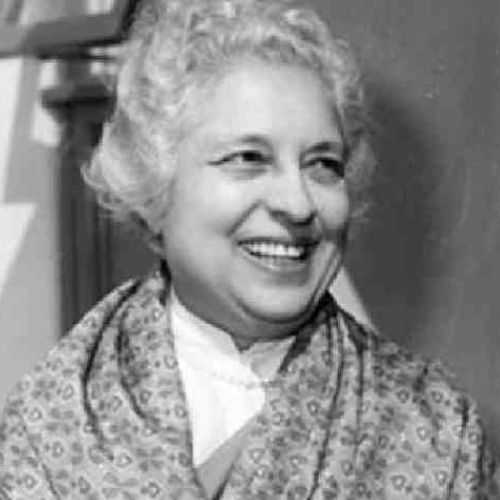Early Life
Vijaya Lakshmi Pandit was born as Swarup Kumari Nehru on 18 August 1900 to the Nehru family. Her father, Motilal Nehru was an illustrious lawyer, political leader and freedom fighter. Pandit did not receive any formal school education but was tutored privately. In 1921 she married Ranjit Sitaram Pandit and changed her name.
Role in India’s independence movement
Pandit actively participated in the freedom struggle, as a result of which she was incarcerated thrice: in 1932-1933, 1940, and 1942-1943.
Contribution to Constitution Making
Pandit was elected to the Constituent Assembly from United Provinces under a Congress party ticket.
Later Contributions
Post-Indian independence, Pandit had a pre-eminent diplomatic career. She led the Indian delegation to the United Nations between 1946–48 and1952–53. Thereafter served as an ambassador to Moscow, Mexico and Washington. In 1953 she became the first woman president of the UN General Assembly. A year later, she concurrently served as an ambassador to England and Ireland.
When Pandit returned to India, she was appointed as the Governor of Maharashtra. Upon Jawaharlal Nehru’s death in 1964, she stood for the Lok Sabha elections from Phulpur and was in the Parliament till 1968.
Even after her retirement from active politics, Pandit sustained a deep interest in Indian political developments. She openly spoke against her niece, Indira Gandhi and was critical of her emergency measures.
Key Writings
Some of Pandit’s works include So I Became a Minister and Prison Days. She also wrote an autobiography The Scope of Happiness: A Personal Memoir.
Pandit supported Nehru’s Objective Resolution and asserted that it strove to secure ‘social, economic and cultural justice’.
- Between Vanity and Sensitiveness: Indo–British Relations During Vijayalakshmi Pandit’s High-Commissionership by Rakesh Ankit (Contemporary British History (2016).
- Madame Ambassador: The Life of Vijaya Lakshmi Pandit by Anne Guthrie (Harcourt, Brace & World, 1962)

